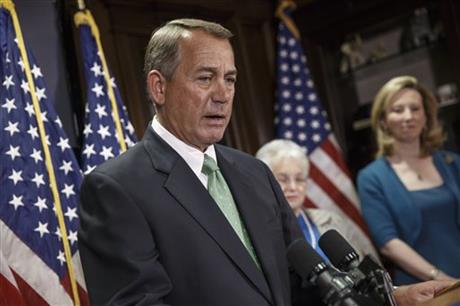
By DAVID ESPO and ALAN FRAM
Republicans newly in charge of Congress challenged President Barack Obama at both ends of the Capitol on Tuesday, lining up in the House to repeal the health care program he signed into law and struggling in the Senate to roll back the immigration policies he issued on his own.
There was a third challenge as well, as Republican leaders announced the House would vote final approval next week on legislation clearing the way for construction of the Keystone XL Pipeline. That would trigger Obama’s threatened veto, the first in a new era of divided government.
The skirmishes all seemed likely to end in eventual defeat for Republicans, but served as a potent rejoinder of their power after Obama challenged them bluntly last month with his State of the Union address and a no-balance budget on Monday that called for higher taxes and new spending. The GOP won control of the Senate in last fall’s elections, and has its largest House majority in nearly 70 years.
In the Senate, Democrats had more than enough votes to block action on legislation to fund the Department of Homeland Security and overturn presidential executive orders that have spared an estimated four million immigrants in the country illegally from the threat of deportation.
They said they were prepared to do so until Republicans relented, and agreed to produce a funding bill for the department, stripped of the immigration provisions.
Senate Majority Leader Mitch McConnell of Kentucky accused Obama of a “power grab” that exceeded his authority as president.
“So I’m calling on Democrats to vote with us now to fund the Department of Homeland Security. I’m calling on Democrats to join us and stand up for core democratic principles like the rule of law and separation of powers,” he said.
It was an offer they said in advance they would refuse.
The Democratic leader, Sen. Harry Reid of Nevada, accused Republicans of threatening a shutdown of the Department of Homeland Security, which will lose some of its funding on Feb. 27 if Congress doesn’t replenish it.
“If Republicans don’t like something President Obama has done dealing with executive orders … bring it up on the Senate floor and let’s have a debate. Let’s not do what happened previously and shut down government,” he said, referring to a partial shutdown in 2013 that resulted from a dispute over funding for the health care law.
Rhetoric aside, the vote appeared to be part of a delicate dance in which the Senate GOP leadership, knowing it lacked the votes to prevail, wanted to demonstrate as much to anti-immigration lawmakers who helped pass the measure through the House last month. The provisions that drew objections from Democrats would roll back administration policies that shield millions of immigrants from the threat of deportation even if they are in the country illegally, and also give protection to younger immigrants brought to the country unlawfully by their parents.
Speaker John Boehner, R-Ohio, said it was up to Republicans like Sen. Ted Cruz of Texas and Jeff Sessions of Alabama as well as Democrats to “stand with the American people and to block the president’s action.” The two Republicans were influential in the House’s decision to toughen the immigration provisions of the House bill, and officials said Boehner’s remark was a challenge to them to make sure the Senate follows suit.
The speaker did not say what the next step would be if, as expected, the bill was bottled up in the Senate. But Rep. John Carter, R-Texas., said the House may eventually have to pass a second bill that extends funding without immigration-related provisions attached. “Ultimately there may be a clean bill sent,” he said.
Across the Capitol, Republicans had more than enough votes in the House to repeal Obama’s health care law, but that bill, like the immigration measure, seemed headed for certain defeat in the Senate and faced a veto threat from Obama.
The House has voted more than 50 times in the past two years to repeal the health care law in whole or in part, but this time was different. The measure included instructions to key committees to begin work on a replacement that the party promised in the 2010 political campaign.
Officials described that as a measure of preparation in case the Supreme Court overturns a key portion of the existing program in a ruling expected this June.
Despite the dozens of previous attempts at repeal, the day gave newcomers to Congress their first opportunity to vote to uproot the health care law.
“Today, I am making good on my commitment to support a full repeal of Obamacare,” said Rep. Alex Mooney, a West Virginia Republican who took his seat in Congress last month.
The announcement that Congress would soon send Obama legislation to approve construction of the Keystone XL pipeline meant the House would accept relatively minor changes that the Senate added when it passed the bill. Among them is a non-binding statement that climate change is not a hoax.
Democrats say they have enough votes to sustain a veto.
_____
AP Writers Erica Werner and Andy Taylor contributed to this story.



